Eamonn’s Story
A little more than halfway through her “uneventful” pregnancy, Meghan thought the cramping she was experiencing was simply due to being on her feet too much at work or an effect of not drinking enough water, but she didn’t want to take any chances. She went to a local hospital in Beverly, MA, and she wasn’t allowed to leave.
The doctor told Meghan that she was in labor and that her baby would arrive within 48 hours despite attempts to slow her labor. The doctor discussed moving Meghan to Boston for delivery so that her baby would be near a Neonatal Intensive Care Unit (NICU), but Meghan’s water broke during the discussion. Meghan was told to push with the next contraction, and very shortly after that, Meghan gave birth to a tiny baby boy weighing a mere one pound and 13 ounces.
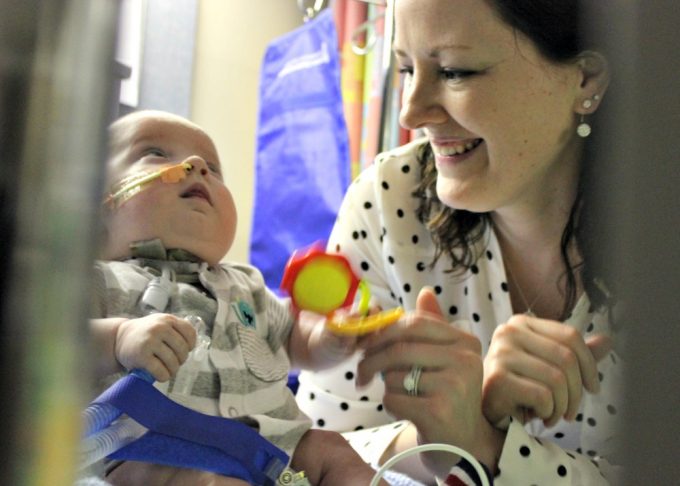
Meghan and her husband named their baby boy Eamonn to pay tribute to their Irish heritage. The new parents didn’t know what to expect…or if Eamonn would survive. He was immediately rushed to the NICU at Boston Children’s Hospital in the company of Meghan’s husband.
“Everyone told us it would be a roller coaster and that there would be ups and downs,” said Meghan from the beginning of Eamonn’s journey. “We thought we understood what that meant at the time, but going through it was very different and we realized nothing could really have prepared us.”
Eamonn battled complication after complication in the NICU
For more than five months (160 days), Eamonn battled complication after complication in the NICU, including a heart condition requiring medication, respiratory distress requiring chest tubes, an intestinal disease that caused a perforated bowel requiring emergency surgery, and many other obstacles.
“Right after Eamonn was born, we were told about several things that he could face due to his prematurity, and we ended up dealing with almost every single one of them,” said Meghan. “Ultimately, Eamonn’s respiratory status has been the most difficult piece to overcome.”
Eamonn was intubated, a procedure that involves a breathing tube being inserted into his mouth and into his trachea. The tube was connected to a ventilator that helped Eamonn breathe for the next three months. The tube was removed, and Eamonn was trialed on a CPAP (Continuous Positive Airway Pressure) device, but he proved not quite ready for that.
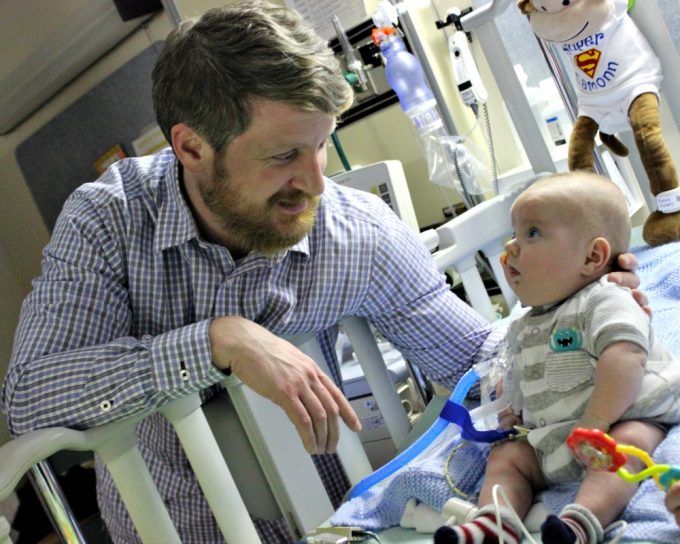
Eamonn then had a tracheotomy, a surgical procedure that creates an opening in the trachea through the neck to insert a tube that allows air passage. Eamonn was placed back on a ventilator and referred to Franciscan Children’s for further treatment, support and rehabilitation.
Eamonn now requires less support from the ventilator and is doing more breathing on his own while still on the ventilator. Soon, Eamonn is expected to come off of the ventilator for brief periods of time which will become longer periods of time until he is able to breathe on his own without the need for a ventilator.
“It has been a very long and difficult journey, but we feel like we are in a good place now…We were able to leave a NICU level environment and come to Franciscan Children’s to focus on getting Eamonn big enough and strong enough to go home, which is an amazing feeling,” said Meghan.
Director of Respiratory, Tom Murphy, sees many infants born prematurely per year who overcome tremendous odds and require months on ventilators at acute care hospitals like Boston Children’s before coming to Franciscan Children’s for further treatment. His Respiratory Therapy team plays an integral part in caring for these patients.
“Respiratory Therapists help patients like Eamonn by supporting their breathing until they are able to breathe on their own or with less respiratory support,” explains Murphy. “We assess their cardio-pulmonary function in particular and manage their artificial airway (trach tube) and mechanical ventilator, administer aerosolized medications and keep their lungs clear of secretions.”
The goal for patients like Eamonn is to gradually wean them from the ventilator says Murphy, although some patients require continued ventilator support or overnight ventilation only. In those cases, the Respiratory Therapists work with families to train them on how to care for their child at home.
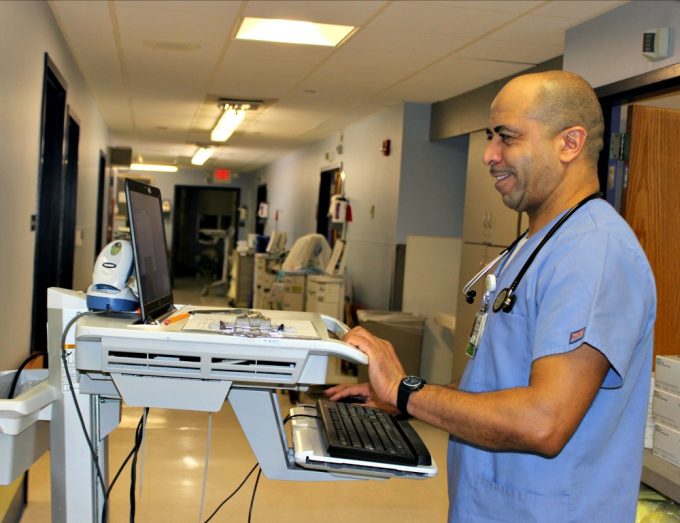
Respiratory Therapist Jérôme Payen works the night shift to provide care for Eamonn and others at Franciscan Children’s. He ensures that patients are breathing safely by clearing their airways. He administers breathing medications and fine tunes their ventilator support. He ends some of the longer ventilator weaning sessions that began during the day shift and provides oversight when many patients go their first full 24 hours off of the ventilator. At this point, many patients will not need the ventilator again. Payen looks forward to this process with Eamonn.
Payen also performs bedside sleep studies and analyzes blood samples that reflect a patient’s breathing status. He recognizes changes in patients’ conditions and determines which ventilator or other piece of equipment to operate to best meet their needs.
That 24-hour care is a blessing to Meghan.
“I get a lot of satisfaction from my job knowing that I am keeping the babies safe so that they can maximize their rehabilitation potential,” explains Payen. “It is not easy working the night shift, but we need to care for our patients continuously around the clock.”
That 24-hour care is a blessing to Meghan.
“The Respiratory Therapists and Nursing staff at Franciscan Children’s have been very diligent in doing Eamonn’s daily cares (everything from feeds, meds, diaper changes, etc.),” said Meghan. “They also go above and beyond to ensure Eamonn is comfortable and entertained. The nurses dress him, make up his crib using his blankets from home, set up things such as his books or stuffed animals for him to look at, put him in his chair or swing, etc. It is nice to walk in and see that they have cared for Eamonn the same way that we would have.”
Murphy says that his team’s goal is to assist more premature patients like Eamonn and their families at Franciscan Children’s.
“…they have cared for Eamonn the same way that we would have.”
“With patients, we see immediate positive feedback when we help solve their breathing problems, and we put families at ease when we do our job well,” said Payen. “We also put families at ease by training them to confidently care for their child at home.”
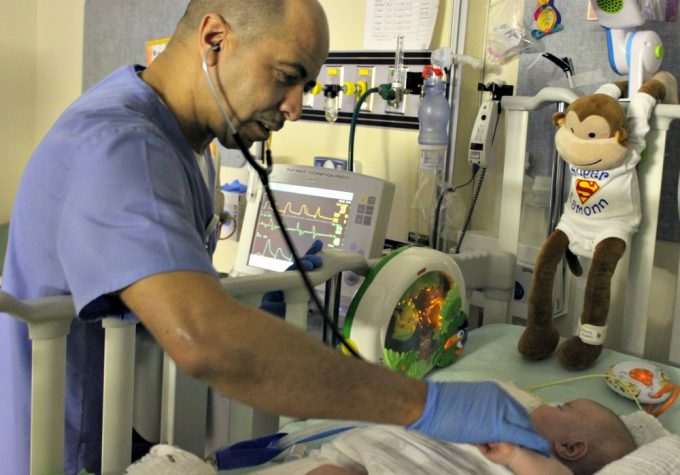
Being involved and gaining confidence in how to care for Eamonn is important to Meghan who rooms in with her little guy at every opportunity.
“This the first time we have been able to spend 24 hours with him and wake up with him next to us,” said Meghan. “It is an amazing feeling to wake up and be able to take a few steps and peer over the crib rails and see his little face.”
Respiratory Therapists are an important part of our inpatient and outpatient health care teams that include nurses, doctors, child life specialists, and therapies such as physical, occupational and speech. All work together to ensure that families are able to see and assist in patient progress, no matter how big or small.
“It is very rewarding for Respiratory Therapists to be able to transition a patient from their bedside ventilator to a portable ventilator and accompany the patient and our Child Life Specialists to the swimming pool, the playground or to a party in the building,” said Murphy. “Being with our patients in a non-clinical environment and seeing them having fun puts smiles on everyone’s faces.”
Payen agrees, “Working with pediatric patients is fun!”
That positivity, compassion and commitment to excellence give confidence to Meghan when she doesn’t spend the night with Eamonn.
“Having Respiratory Therapists overnight, in conjunction with the nursing staff, gives us additional peace of mind that if something were to happen, Eamonn would be in good hands,” said Meghan. “It is very difficult to leave your child, but I think it says a lot that my husband and I are comfortable enough to go home and sleep at night when we want to.”
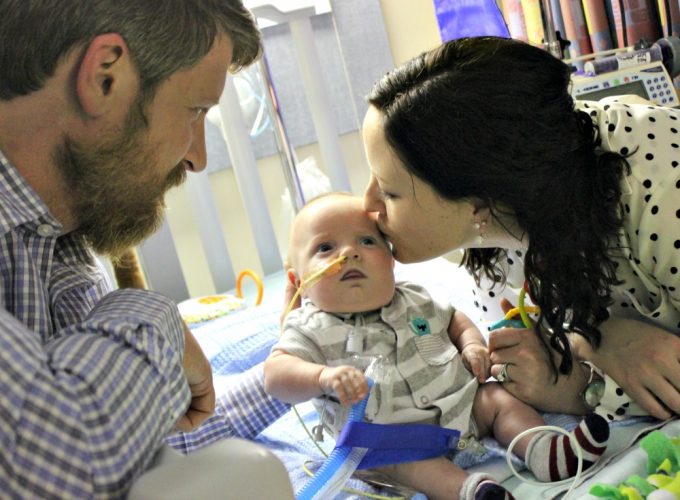
Meghan and her husband, along with Eamonn’s grandparents, have all been involved in caring for Eamonn since their arrival at Franciscan Children’s. Meghan says that the support and mentoring from medical staff gives her confidence that she will be able to care for Eamonn at home when that time comes.
Meghan has been by Eamonn’s side since their journey began at nearly 25 weeks, and although there’s no place she’d rather be, she’s ready for her little superhero to learn to fly on his own.
“We look forward to when Eamonn can run around like any other kid without being attached to tubes and monitors.”
Want to share your story? Send it our way to stories@franciscanchildrens.org.
Explore All Stories